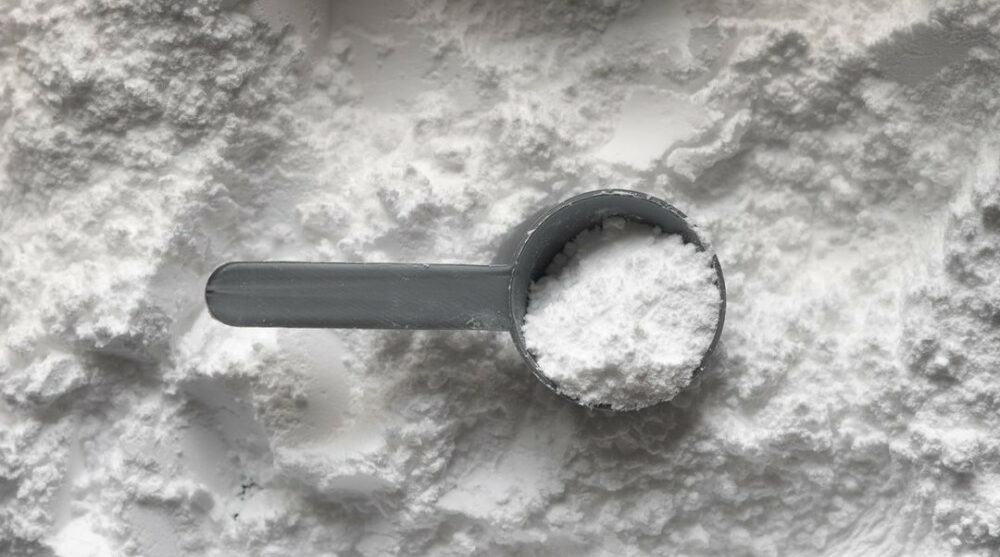There are many people searching the internet and fitness forums asking can creatine cause headaches? In short, the answer is ‘no’, but In this article we’ll look at why people are making the association between creatine supplementation and headaches as well as looking at the latest scientific research on the safety, risks and benefits of this popular sports supplement. You don’t want to skip this.
[lwptoc]

What Is Creatine?
In a past article looking at the different types of creatine we summarized what creatine is and where it comes from, however, we’ll cover it again here.
Creatine is a naturally occurring substance found in our food and also produced within our bodies. However, without a dietary source of creatine we can become creatine deficient.
Good dietary sources of creatine are foods, such as beef or salmon, will contain between 1 or 2 grams of creatine per pound (450g).
This means that you’d have to eat an awful lot of beef or salmon to receive an effective amount of creatine which is generally considered to be around 5 g per day.
When we say an effective amount of creatine we mean enough to elicit a beneficial effect upon both exercise performance and muscle growth.
Creatine supplements enable you to consume an effective amount of creatine conveniently and economically – given that creatine is such an affordable supplement.
These supplements are manufactured through a chemical process where the two main ingredients are a synthesized version of the amino acid sarcosine and the organic compound cyanamide.
Why Do People Think Creatine Causes Headaches?
Reading across a number of different fitness forums, it seems that some people start taking creatine and then complain that they are experiencing headaches.
However, correlation doesn’t mean causation, and as we’ll see, there may be other reasons for this pattern between starting creatine supplementation and an increase in headaches.
Given that creatine draws water into the muscles and causes them to hold on to that water, some people seem to believe that causes some kind of increase in internal pressure within the body.
Others seem to draw a link between the abdominal cramping that can sometimes be caused by excessive consumption of creatine (sometimes referred to as a loading phase) and headaches.
In all of the reports from people who have experienced headaches following creatine supplementation it seems that people are failing to take into account the increased intensity of their exercise sessions when using creatine.
The Effect of Creatine Supplementation On Your Workouts
OK, so stick with us and we’ll do our best to explain how creatine works. We’ve made this as brief as possible, but it’s still going to take some explaining!
Imagine you’ve warmed up and are about to hit your heaviest weight in your barbell bench press. You’re aiming for 5 reps.
You know from experience that your first rep of a set is easier than the last rep when you’re lifting heavy, right?
You probably frame this in your own mind that you’re losing strength through the set, but in reality, you’re losing ENERGY.
How Creatine Works
The fuel for our muscles is a molecule called ATP (let’s not get bogged down with what that stands for).
ATP has three phosphate molecules attached to it, in a chain formation.
It’s these phosphate molecules – and specifically the third phosphate molecule in the chain – that provides our muscles with the explosive energy needed to get our muscles to lift heavy weights.

At the beginning of the first set, your muscles are filled up with ATP but because ATP is unstable, your muscles can only store so much.
So as you progress through that first heavy set, you begin to run out of steam as you progress through the reps until you hit failure, or near failure, and have to put the weights down.
What has happened is that your stores of ATP have used a phosphate molecule and have now become something called ADP.
The body is amazing though, because as you rest between sets, some of the energy is replenished and you’re ready to go again after a minute or two. This happens because your body knows how to replenish the remaining ADP back to ATP!
Your body does this by producing an enzyme called creatine kinase which is used to recruit another another molecule, creatine phosphate, to deliver a replacement phosphate molecule to the ADP molecule which restores it back to ATP!
When the body’s creatine phosphate supply is depleted, it can no longer perform this phosphate replacement maneuver and your body is then forced to rely on a different energy system: the anaerobic system.
This isn’t as explosively powerful as the phosphagen system we’ve described here. The difference between the two energy systems is best understood by considering how we are able to lift lighter weights for many more reps than we can with heavier weights.
When you use creatine monohydrate, your body turns this into create phosphate so that you have far more phosphate molecules available than would ordinarily be the cause, meaning more ADP can be recycled and you will have far more explosive energy and power available for your workout.
It sounds great doesn’t it?!
And it is.
What Could be Causing the Headaches?
But as you can imagine, this means that you are able to work out with heavy weights with more intensity than you could ever imagine without supplementing with creatine.
That extra intensity of exercise is the most likely cause of headaches.
The Mayo Clinic confirms that healthcare professionals recognize that sustained, strenuous exercise is a common cause of headache.
They describe two types of exercise headache: primary (usually harmless) and secondary (serious and caused by an underlying condition).
So we believe that it’s not creatine itself that causes headaches, but instead the increased intensity of your weight lifting session that is to blame.
This could be the result of any number of factors, including dehydration – so make sure that you keep your liquid intake high when exercising and generally throughout the day if supplementing with creatine.
In fact, check out this interview with Dr Joe Congeni where he discusses how intense weight training can lead to exertional headaches.
What Does The Science Say About Creatine And Headaches?
I know we’ve just bombarded with you with science, but bear with us just a little bit longer. We’ll keep this concise, but you’re really not going to want to miss this information!
We found no scientific evidence to suggest that there is any causal link between creatine supplementation and headaches.
But what we did find is really interesting.
In a 2008 study evaluating the clinical benefit of administering creatine to 39 children and adolescents who had suffered traumatic brain injury, it was concluded that:
“Significant improvement was recorded in the categories of headache […], dizziness […] and fatigue […], aspects in all patients. No side effects were seen due to Cr administration.”
So this paper suggests that creatine is capable of reducing headaches!
Let’s have a quick review of some of the other interesting findings that our research of the scientific literature concerning creatine supplementation unearthed.
Does Science Have Anything Else To Say About Creatine?
Here’s a summary of what we found – prepare to be AMAZED!
Creatine administration is known to diminish fat accumulation in the liver, resulting in beneficial effects in fatty liver and non-alcoholic liver disease.
Blood flow restriction training and sports nutrition supplements, including creatine, improve lean mass and physical function in abdominal cancer patients prior to surgery.
This 2019 meta-analysis concluded that “the findings indicate that creatine supplementation does not induce renal damage in the studied amounts and durations.”
A randomized controlled trial of 18 males supplementing with creatine concluded that “creatine monohydrate supplementation did not cause adverse events and, as expected, promoted an increase of the performance and body weight”.
This 2020 review states that there is emerging evidence of “a potential therapeutic role for creatine in several pathologies such as myopathies, neurodegenerative disorders, metabolic disturbances, chronic kidney disease and inflammatory diseases.” It even confirms that it has been found that creatine may serve as a potential antioxidant and anti-inflammatory.
I was totally shocked at these findings. I was confident that creatine is safe – in fact, it’s the one of only two sports supplements I’d ever consider using – but I wasn’t expecting to find that creatine supplementation is quite so beneficial outside of increasing endurance and strength.
I’m excited about these findings and looking forward to what future scientific reviews and trials reveal about this affordable wonder supplement!
Are You Interesting In Supplementing With Creatine?

If after reading this article you’re still sitting on the fence wondering whether to supplement with creatine, you may want to check out this article on how to reduce myostatin where you will learn about the role creatine can play in reducing serum myostatin and why that could be important for muscle growth!
This may well make your mind up!
I hope you’ve enjoyed this deep dive exploring the answer to the question: can creatine cause headaches? We’ve looked at how creatine actually works as well as the latest science in our search for evidence of some link between creatine supplementation and headaches.
We’ve learnt that not only were we unable to find any such evidence, but that there is overwhelming and growing evidence that creatine is not only safe and effective as a sports supplement, but that it has many other benefits too.
Let me know what your thoughts are about creatine in the comments and whether you’ve ever experienced a headache after using it.


